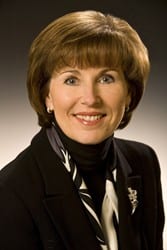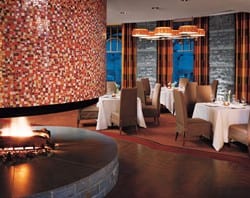Luxury’s Leading Lady
An interview with Kathleen Turner, CEO of Four Seasons
By Jana Schiowitz
 Last month, when Four Seasons founder Isadore Sharp chose Kathleen
Last month, when Four Seasons founder Isadore Sharp chose Kathleen
Taylor as his successor, he made her the only woman CEO among the big
luxury hotel brands. Yet it was a decision that was long in the making.
For more than 20 years, Taylor has risen through the Four Seasons
ranks, wearing various hats-from corporate counsel to worldwide
operations president to president and COO, and now president and
CEO-and along the way, helped the company quadruple in size. Here,
Taylor opens up about her journey, treating others as she would like to
be treated, and why Four Seasons should open a hotel in Rome.
HD: With your new role, what are your plans for the company?
KT: Currently we’re embarking on the largest international
expansion in the company’s history. We have more than 50 projects in
some stage of planning or development, so my primary focus is ensuring
that we do that successfully-staying true to our values as we continue
to grow.
HD: What does luxury mean for Four Seasons?
KT: It has never been about the extravagance or excess often
equated with the word. What we do is essential for travelers who want
to be sure their time and travel dollars are being well spent. It’s not
extravagant. In fact, it’s quite basic. We help guests make the most of
their valuable time by providing them with reliable, consistent,
just-for-me service, drawing on the foundation of our company
culture-to treat others as we wish to be treated.
 HD: Luxury has definitely changed since you came on board in 1989. What is the biggest shift you’ve seen?
HD: Luxury has definitely changed since you came on board in 1989. What is the biggest shift you’ve seen?
KT: Our guests have always had high expectations and we pride
ourselves on being able to consistently deliver on them. Recently,
we’re seeing that today’s restaurant consumer is looking for a less
formal, accessible dining experience so we’re focused on meeting those
needs. In most instances, people are looking for a relaxed and inviting
atmosphere where they don’t necessarily have to dress formally; they
may not want three courses served on fine china, but appreciate smaller
dishes that can be shared; they want comfortable surroundings with a
design that reflects their lifestyle, or a lifestyle they aspire to;
they expect quality and innovation in their food and servers who are
welcoming and well informed; and they want a restaurant that has a
certain vibe to it-a place that is lively and energetic.
With all of this in mind, we aim to create a sense of place in our
restaurants, with a strong food and beverage concept that is contextual
to the destination, leveraging the expertise of our chefs who not only
immerse themselves in the local cuisine, but also bring a wealth of
international influences to their
craft. We’re moving away from the standard features of special occasion
dining, such as white tablecloths, leather bound menus, and fine china
and silverware, to take a more modern approach. We now engage designers
with specific expertise in restaurant design to develop spaces that
make a statement, creating restaurants that are interesting,
experiential, and memorable.
HD: You  started your career working at a Toronto law firm. How did you transition to hospitality and why?
started your career working at a Toronto law firm. How did you transition to hospitality and why?
KT: I actually stumbled into my first job with Four Seasons. By
the time I graduated from law and business school, I was almost 30
years old. Back then the accepted trend was to set a ‘five-year career
plan.’ Given my age and the fact that my friends were much farther
along in their adult lives, I didn’t think I had time for that. I
decided mine would be more like a three-year plan. After three years
practicing as a corporate securities lawyer, at the suggestion of a
former Goodmans colleague, I was asked to join Four Seasons. At that
time, I thought I’d be able to gather a wide range of business
experience and maybe even travel a bit. Nonetheless, I fully expected
that in order to move up in my career I would eventually need to move
on.
To my surprise, what I found was something completely unique and quite
refreshing. Working at Four Seasons for me quickly became much more
than just a job. It felt like I had truly become part of a new and
extended family-and I’ve never looked back.
 HD: What has been your proudest professional achievement?
HD: What has been your proudest professional achievement?
KT: My recent appointment as president and CEO is definitely my
proudest professional achievement, but it certainly isn’t the only one.
Just a few years after I arrived at the company, my boss left and I was
given the opportunity of a lifetime. I was young, relatively
inexperienced, and had just returned to work after the birth of my
first child. In some circles promoting someone at that stage in life
might have been perceived as a risk, but the company took a chance on
me and I assumed the role of general counsel heading up our business
negotiations worldwide. To me that was a sign of loyalty and respect.
It was during this time, in 1992, that Four Seasons acquired Regent
International Hotels, jump-starting our entry into the Asian market. It
was very exciting and I’m immensely proud of the role I played as chief
negotiator.
HD: What are some of the greatest lessons you’ve learned along the way?
KT: At the end of the day, we’re in a people business. Whether
you’re in housekeeping, food and beverage, engineering, or marketing,
our business is all about satisfying the needs of the customer. If you
stay focused on that, you can’t go wrong.
 HD: What do you think makes Four Seasons such a successful company?
HD: What do you think makes Four Seasons such a successful company?
KT: A couple of decades ago, we established a company credo; a guiding
principle for everyone in the organization to follow. Quite simply, our
credo is based on the Golden Rule: ‘To treat others as we would wish to
be treated ourselves.’
The Golden Rule guides our interactions with our guests, our business
partners, and our investors-but most importantly-with each other. The
simple premise of treating others as we would want to be treated is
understood in every country, every culture, and by every individual. In
fact, it’s the universality of the values summed up in the Golden Rule
that give Four Seasons culture its emotional power, allowing us every
time we open a hotel to turn a group of relatively ordinary people into
a world-class service organization. Undoubtedly, the passion of our
workforce is truly the power behind our business success.
 HD: With a current portfolio of 82 global properties, and 50 new
HD: With a current portfolio of 82 global properties, and 50 new
projects in development, your travel schedule must be quite hectic. Do
you have a favorite place or property?
KT: I couldn’t pick a favorite property-it would be like asking
me to choose my favorite child! But undoubtedly, my favorite city to
visit is Rome.
HD: Speaking of growth, are there any global markets Four Seasons is looking to expand in?
KT: Absolutely. Four Seasons is still a relatively small hotel
company and there are many important destinations where we don’t yet
have a presence. Latin America and Africa are areas of great
opportunity for us. We currently have one hotel in India and three in
China, but are focused on strengthening our presence in those
countries. In North America, where we have the deepest market
penetration, there are still important markets where we’d like to
welcome guests in the near future, including Orlando, Aspen, and
California Wine Country. In Europe, we’re actively pursuing projects in
Spain and Germany and of course, we need to be in Rome, my favorite
city!
Pictured from top left: Kathleen Taylor; Cucina at the Four Seasons Hotel Los Angeles at Beverly Hills; another dining shot at Four Seasons Hotel Los Angeles at Beverly Hills; Four Seasons Hotel Denver; Four Seasons Hotel Hangzhou at West Lake; Four Seasons Resort Whistler


